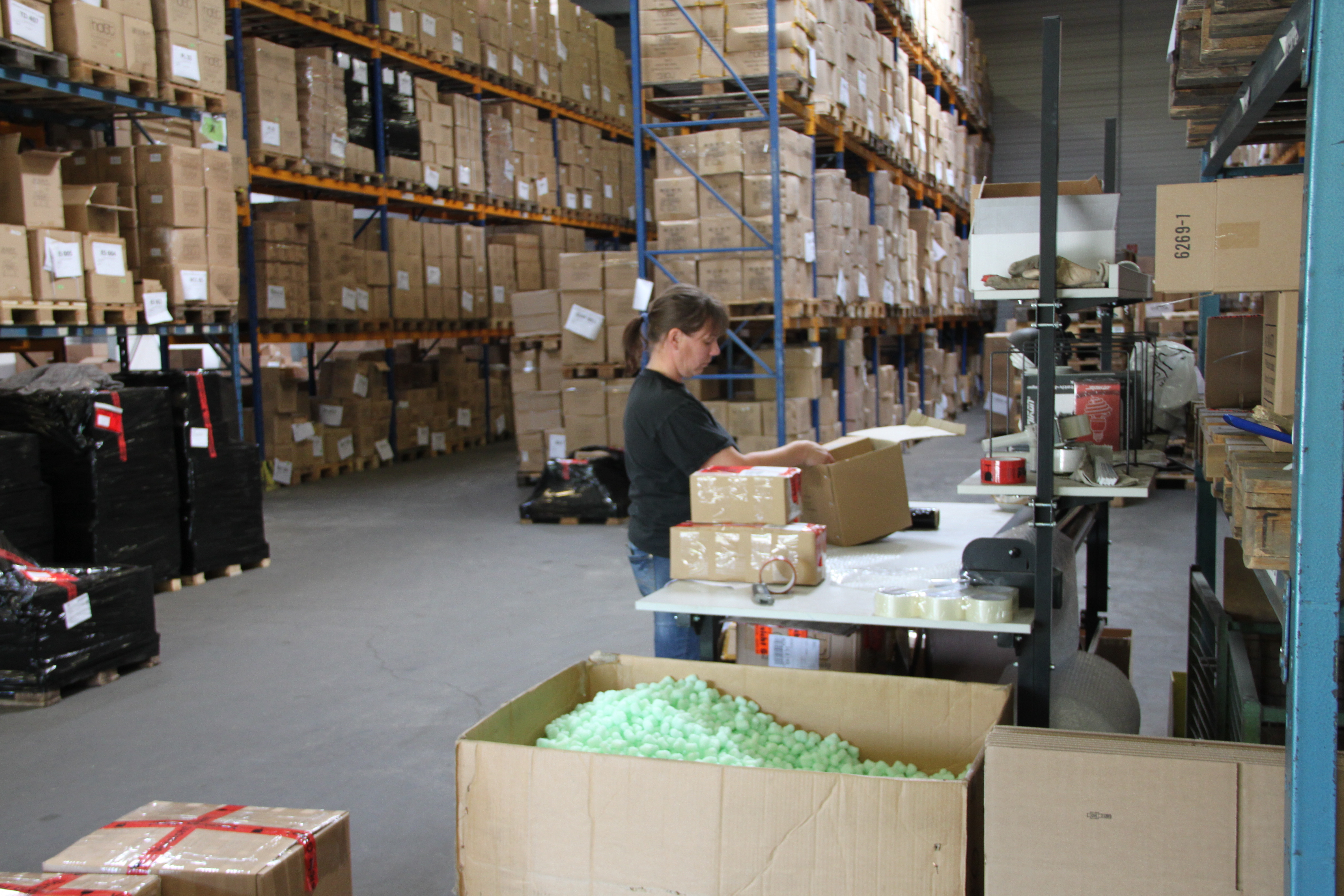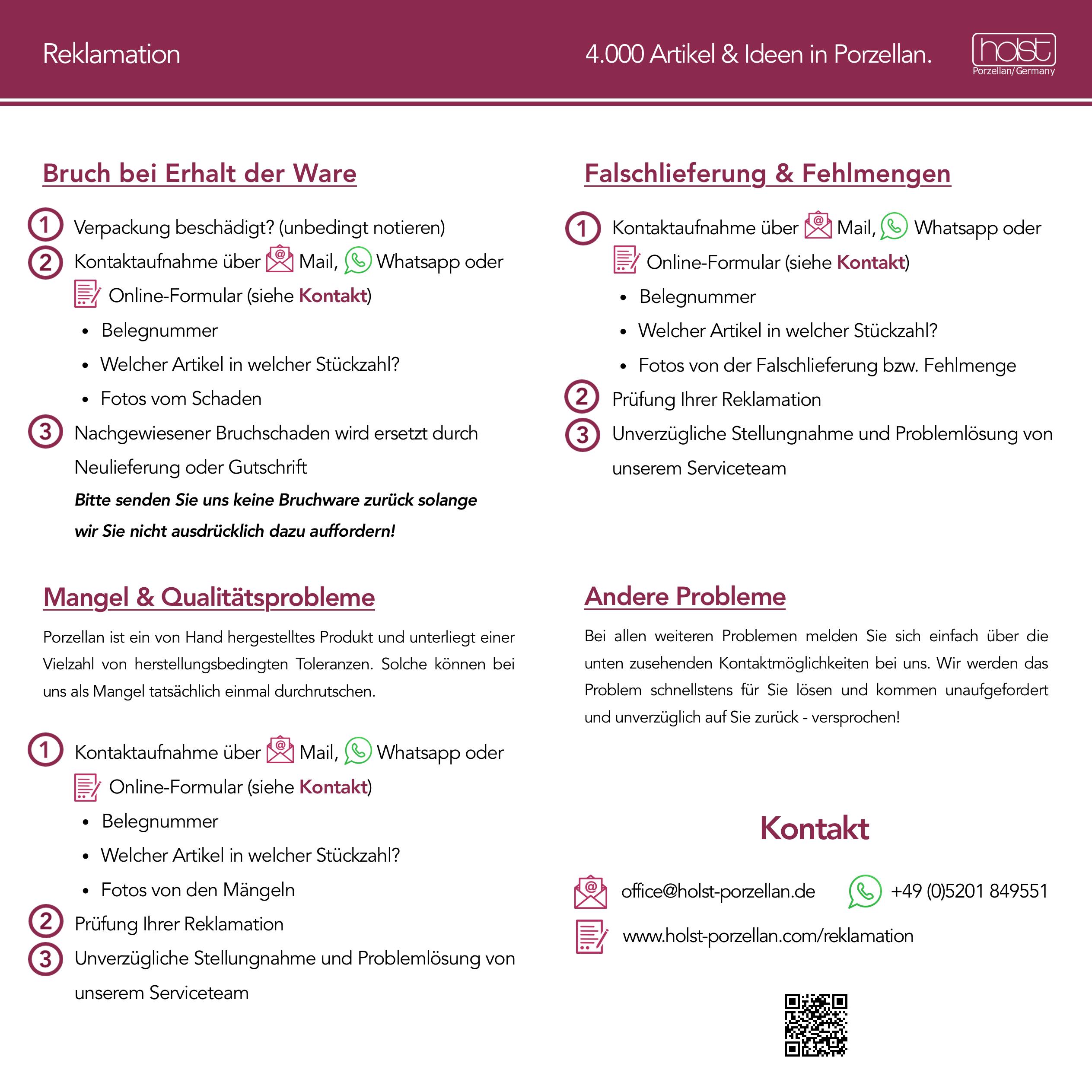Complaints
Foreword to complaints
The satisfaction of our customers is very important to us. Since 1928, we have been working with the will to put our goods and our service at the service of our customers. That is why we at Holst Porzellan operate our own logistics in Bielefeld without external companies. This is the only way we can maintain our delivery and quality service! However, no person, no institution and no company is free from errors. In order to make the processing of a return or a return request as fast as possible, as good as possible and as favourable as possible, we urgently and irrevocably ask you to observe the following regulations and guidelines, thank you very much.
You are no longer sure where you bought?
In 7 out of 10 cases of a complaint, we are unfortunately not responsible because Holst Porzellan was not the contractual partner in the purchase process. This mainly concerns online shop portals, e.g. Amazon, Kaufland, Metro and others. If you cannot clearly identify the seller of our goods, please use this complaint form.
As far as possible, please avoid making initial contact by telephone. Give us the opportunity to identify your contractual partner, compile all the supporting documents and, if necessary, trace any quality defects before further processing in our warehouse. In the event of breakages and shortages, we will check the dispatch weight, parcel service and packing lists in advance. A written report is therefore faster and more precise - that's a promise! Link here.
You still know where you bought it
This will make it a little easier for everyone to help you quickly. Please use one of the following options for your complaint Contract partner for your complaint
- Guide to complaints & returns requests Holst-Shop private customers (B2C)
- Guide to complaints & returns requests Holst-Shop catering & commercial customers (B2B)
- Guide to complaints & returns requests for Holst resellers (WVK)
- Guide to complaints & returns requests Holst factory outlet customers
- Complaints & return requests guide for Amazon customers
- Guide to complaints & returns requests for Kaufland online customers
- Guide to complaints & returns requests Metro Online customers
Nevertheless, you should be familiar with the following elements of a complaint. Therefore, please read on.
§ Complaint in the legal sense
A complaint (Latin reclamare, "to shout, shout back, contradict loudly") is a notice of defect with which a client, a customer or, more colloquially, the buyer complains to his contractual partner about a defect in a purchased item or service. The fact that the term "complaint" is legally defined by other terms in all regulatory laws and ordinances leads many consumers to ask what a complaint is. Complaint means that a contracting party, usually the buyer, exercises his statutory right to a warranty.
This is not to be confused with the right of cancellation or the guarantee. A complaint therefore always requires a material defect in or through the fulfilment of a purchase or service contract that already existed before the transfer of risk. The form and deadlines for submitting such a notice of defect depend on the type of defect (hidden or obvious defects), the type and status of the contracting parties (merchants or consumers), as well as any individual contractual components of the legal transaction.
Legitimate notification of defects
The legal validity of a notice of defect (complaint) depends on the assessment of the defect itself and comprehensible documentation to the contractual partner to check this assessment of the defect. Every complaint therefore begins with documentation (article & quantity) and a description of the defect; in the case of porcelain, this should always be done with pictures (e.g. mobile phone photos). To make it as easy as possible for our customers, we have provided an online complaint form for this purpose. Of course, we also accept complaints by post, e-mail, WhatsApp or fax.
As far as possible, please avoid making initial contact by telephone. Give us the opportunity to collate all receipts and, if necessary, to trace any quality defects before further processing in our warehouse. In the event of breakages and shortages, we will check the dispatch weight, parcel service and packing lists in advance. A written report is therefore faster and more precise - we promise! Link here.
Defects due to quality problems
Porcelain is an earthly and mostly handmade product and is subject to a large number of production-related tolerances. These can actually slip through as a defect in view of the quantities we move. Our explanation of defects and characteristics of porcelain and ceramic goods in our product information section will also help you to assess whether a certain characteristic is a defect or a property.
It goes without saying and is also a sign of proper commercial practice that goods which are defective or faulty or which do not fulfil the warranted characteristics will be exchanged or reduced in price. Of course we honour this!
It is important for our quality management to investigate every quality defect in detail. Please help us to process your complaint quickly and easily for you by sending us photos of the defective goods by email, WhatsApp or via our complaint form, stating the quantity, article and a document number (delivery note or invoice). This will allow us to check the process without you wasting any unnecessary time. We will then get back to you without being asked and without delay - we promise! Link here.
Replacement or reduction
An exchange or returns process can quickly exceed the value of the goods in the case of inexpensive porcelain. Often it is only minor defects that give rise to a complaint. As soon as we have been able to trace the defect using the complaint form, we will immediately work out a solution proposal for the individual case. In the worst case scenario, the defect may even be due to a series fault, which would also affect a possible replacement. For this reason alone, please give us the opportunity to check your request before contacting us.
Returns & returns of defective goods
The return of goods is a contractual obligation and legal act of rescission, i.e. the reimbursement of the purchase price of a purchased item after it has been returned after it has turned out to be defective within a given period. In German sales law, the right to rescission was a warranty claim for material defects. According to the legal definition in Section 462 of the old version of the German Civil Code (BGB), this involved the reversal or cancellation of the purchase contract. Nevertheless, the principle of no return of goods without a return note applies! After cancellation, the buyer can demand the return of the purchase price and the seller can demand the return of the purchased item. As a result of the modernisation of the law of obligations on 1 January 2002, the legal institution of rescission (§ 323, §§ 346 ff. BGB), which is regulated in the general law of obligations, has taken the place of rescission. In addition, § 437 No. 2 and § 440 of the German Civil Code (BGB) and the provisions mentioned therein apply in sales law. Both legal forms see the return of goods only in direct connection with a defective fulfilment of the contract.
If Holst Porzellan is the contractual partner responsible for rectifying the defect, we are also responsible for rectifying the complaint! This promise applies without ifs and buts! If the only solution available in this context is to take back the goods, we will bear the cost of this. However, we cannot process returns without a returns note and you will lose the right to a refund.
Therefore, always request a returns slip
Contractual partner for your complaint or return request
- Guide to complaints & returns requests Holst-Shop private customers (B2C)
- Guide to complaints & returns requests Holst-Shop catering & commercial customers (B2B)
- Guide to complaints & returns requests for Holst resellers (WVK)
- Guide to complaints & returns requests Holst factory outlet customers
- Complaints & return requests guide for Amazon customers
- Guide to complaints & returns requests for Kaufland online customers
- Guide to complaints & returns requests Metro Online customers


